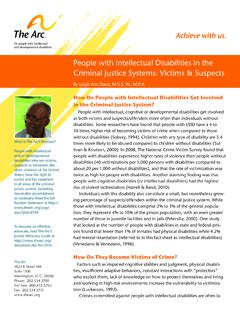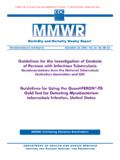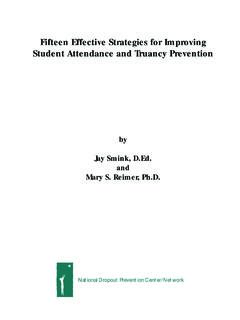Transcription of Causes and Prevention of Intellectual Disabilities - The Arc
1 Causes and Prevention of Intellectual DisabilitiesWhat Is Intellectual Disability? Intellectual disability is a disability that occurs before age 18. People with this dis-ability experience significant limitations in two main areas: 1) Intellectual function-ing and 2) adaptive behavior (the use of everyday social and practical skills) (AAIDD, 2010). Intellectual disability is diagnosed through the use of standardized tests of intelligence and adaptive behavior (and cannot be determined by IQ alone). People with Intellectual Disabilities who are provided appropriate personalized supports over a sustained period generally have improved life outcomes. In fact, many adults with Intellectual Disabilities live independent, productive lives in the community with support from family, friends and agencies like The Arc.
2 What Are the Causes of Intellectual Disability? Intellectual disability can be caused by any condition that impairs development of the brain before birth, during birth or in the childhood years. Several hundred Causes have been discovered, but in about one-third of the people affected, the cause remains unknown. The three major known Causes of Intellectual disability are Down syndrome, Fetal Alcohol Spectrum Disorder (FASD) and Fragile X syndrome. The Causes can be categorized as follows: Genetic conditions - These result from abnormalities of genes inherited from parents, errors when genes combine, or from other disorders of the genes caused during pregnancy by infections, overexposure to x-rays and other factors. There are many genetic diseases associated with Intellectual disability.
3 Some examples include PKU (phenylketonuria), a single gene disorder. Due to a missing or defective enzyme, children with PKU cannot process a part of a protein called phenylalanine. Without treatment, phenylalanine builds up in the blood and Causes Intellectual disability. Down syndrome is an example of a chromosomal disorder. Chromosomal disorders happen sporadically and are caused by too many or too few chromo-somes, or by a change in structure of a chromosome. Fragile X syndrome is a single gene disorder located on the X chromosome and is the leading inherited cause of DID YOU KNOW?There are over several hundred Causes of Intellectual Disabilities ? The three major known Causes are: Down syndrome Fetal Alcohol Spectrum Disorder (FASD) Fragile X syndromeThe Arc1825 K Street NWSuite 1200 Washington, D.
4 C. 20006 Phone: free: : For more information on this and other topics, visit disability. Problems during pregnancy - Use of alcohol or drugs by the pregnant mother can cause Intellectual dis-ability. In fact, alcohol is known to be the leading preventable cause of Intellectual disability. Recent research has implicated smoking in increasing the risk of Intellectual disability. Other risks include malnutrition, certain environmental toxins, and illnesses of the mother during pregnancy, such as toxoplasmosis, cytomegalovirus, rubella and syphillis. Problems at birth - Prematurity and low birth weight predict serious prob-lems more often than any other condi-tions. Difficulties in the birth process such as temporary oxygen deprivation or birth injuries may cause Intellectual Disabilities .
5 Problems after birth - Childhood diseases such as whooping cough, chicken pox, measles, and Hib dis-ease that may lead to meningitis and encephalitis can damage the brain, as can injuries such as a blow to the head or near drowning. Lead, mercury and other environmental toxins can cause irreparable damage to the brain and nervous system. Poverty and cultural deprivation - Children growing up in poverty are at higher risk for malnutrition, childhood diseases, exposure to environmen-tal health hazards and often receive inadequate health care. These factors increase the risk of Intellectual dis-ability. Also, children in disadvantaged areas may be deprived of many com-mon cultural and educational experi-ences provided to other youngsters. Research suggests that such under-stimulation can result in irreversible damage and can serve as a cause of Intellectual Intellectual Disabili-ties Be Prevented?
6 During the past 30 years, sig-nificant advances in research have prevented many cases of Intellectual disability. For example, every year in the United States, we prevent: 250 cases of Intellectual disability due to phenylketonuria (PKU) by new-born screening and dietary treatment; 1,000 cases of Intellectual disability due to congenital hypothyroidism thanks to newborn screening and thy-roid hormone replacement therapy; 1,000 cases of Intellectual disability by use of anti-Rh immune globulin to prevent Rh disease and severe jaun-dice in newborn infants; 5,000 cases of Intellectual disability caused by Hib diseases by using the Hib vaccine; 4,000 cases of Intellectual disability due to measles encephalitis thanks to the measles vaccine; and Untold numbers of cases of intel-lectual disability caused by German measles during pregnancy thanks to rubella vaccine (Alexander, 1998).
7 Other interventions have reduced the chance of Intellectual disability. Removing lead from the environment reduces brain damage in children. Preventive interventions such as child safety seats and bicycle helmets re-duce head trauma. Early intervention programs with high-risk infants and toddlers have shown positive effects on Intellectual functioning. Finally, early comprehensive prenatal care and preventive measures prior to and during pregnancy increase a woman s chances of preventing Intellectual disability. Dietary supplementation with folic acid, taken before and during pregnancy, reduces the risk of neural tube defects. Women who have phenylketonuria (PKU) should be counseled to go on a restricted phenylalanine diet three months prior to pregnancy to prevent Intellectual disability in their is prenatal care important in preventing Intellectual and other similar Disabilities ?
8 The health of a baby can depend on how healthy a mother is before preg-nancy. Ideally, she should obtain a general health assessment six months before pregnancy that includes: updating immunizations; reviewing use of medications; reviewing diet and vitamin supple-mentation, including folic acid; considering genetic counseling; and stopping use of alcohol, cigarettes or other tobacco forms, illegal drugs, and legal drugs not approved by the doctor. Prenatal care should begin as soon as she suspects she is pregnant. Dur-ing pregnancy, a woman can protect the developing fetus by: getting plenty of rest and sleep; eating nutritious meals; avoiding alcohol, cigarettes and drugs; avoiding people who are sick; wearing seat belts in a car; and not lifting heavy should genetic counseling be considered?
9 Genetic counseling should be consid-ered if: the child may inherit a genetic or chromosomal disorder because of a specific condition in the family; a previous birth to either parent resulted in a child with a genetic disor-der, unexplained Intellectual diasbility or a birth defect; the mother has had two or more miscarriages or a baby who died in infancy; the mother is 35 years of age or over; either partner is of a race or ethnic group with a high incidence of a ge-netic condition; and the partners are blood can Intellectual Disabilities be prevent-ing during childhood? Intellectual disability can be pre-vented during childhood by knowing the Causes and taking steps to keep children safe and healthy. These steps include: Childhood immunizations to pro-tect children from at least six diseases that can lead to brain damage.
10 These include measles, mumps, pertussis (whooping cough), Hib disease, vari-cella (chicken pox), and pneumococ-cal disease. Injury Prevention to avoid brain damage, such as using bicycle helmets and safety seats and seat belts in au-tomobiles; preventing near-drowning; preventing falls and protecting babies from severe shaking. Newborn screening to identify treat-able genetic conditions. Reducing the incidence of Reye s syndrome caused by giving medi-cines containing salicylate (aspirin); instead, using medicines containing acetaminophen (such as Tylenol) to reduce the brain damage caused by Reye s syndrome. Reducing exposure to lead, mercury and other toxins in the environment that are known to cause brain dam-age. Protecting children from household products that are more information on this and other topics, visit can I find more information about Prevention ?








